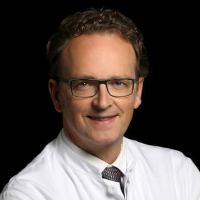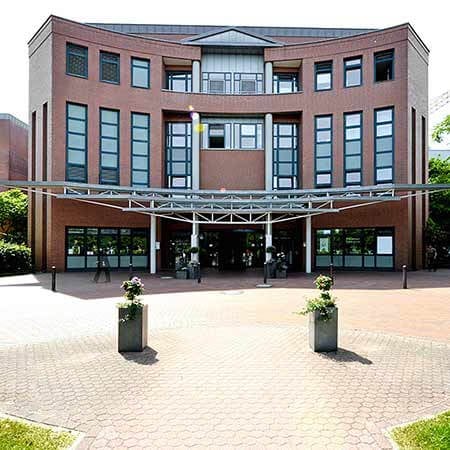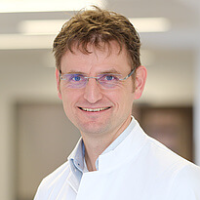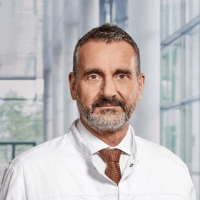Surgical Correction of Partial Anomalous Pulmonary Venous Connection in Germany
Treatment prices are regulated by national law of the corresponding countries, but can also include additional hospital coefficients. In order to receive the individual cost calculation, please send us the request and medical records.

Department of Cardiothoracic Surgery
According to the Focus magazine, the Department of Cardiothoracic Surgery ranks among the top German medical facilities specializing in the surgical treatment of diseases of the cardiovascular system and lung cancer! The department offers the full range of surgical services for the treatment of diseases of the cardiovascular system, respiratory tract, including heart and lung transplantation, artificial heart implantation. The therapeutic options include aortic surgery, coronary artery bypass grafting, transplantation surgery, surgical treatment of heart rhythm disorders (arrhythmias), minimally invasive surgery, surgical treatment of the heart valves, including reconstructive interventions. All operations are performed using state-of-the-art technology and in accordance with the current recommendations of professional societies.






Department of Cardiac Surgery
The Department of Cardiac Surgery provides a full range of surgical treatment in its area of specialization. Special emphasis is placed on heart valve repair and replacement surgery, coronary artery bypass grafting, thoracic aortic surgery, adult congenital and acquired heart disease surgery, pacemaker and defibrillator implantation, and artificial heart implantation for severe heart failure. Many heart operations are performed using minimally invasive techniques, which has a positive effect on the healing of the surgical wound. Minimally invasive cardiac procedures also reduce surgical risks and contribute to a rapid recovery of the patient in the postoperative period. Surgical treatment of cardiac pathologies is performed in advanced operating rooms equipped with the latest technology. The cardiac surgeons of the department successfully perform routine and complex surgical procedures, saving the lives of thousands of patients. The specialists work in accordance with current clinical protocols and follow the recommendations of the German Society for Thoracic and Cardiovascular Surgery (DGTHG).


Department of Cardiothoracic Surgery and Vascular Surgery
The Department of Cardiothoracic Surgery and Vascular Surgery provides effective surgical treatment for diseases of the heart, respiratory system, and blood vessels. The team of cardiac surgeons operates on patients with heart valve pathologies, coronary heart disease, heart failure, and heart rhythm disturbances. In the field of thoracic surgery, the key focus is on the surgical removal of lung tumors and lung metastases. The specialists in this area also perform surgery to repair chest wall deformities. In the field of vascular surgery, interventions for abdominal and thoracic aortic aneurysms are most often performed here. The department's vascular surgeons are also exceptionally competent in the treatment of peripheral occlusive arterial disease. A great advantage for the department's patients is that almost all surgical interventions are performed using minimally invasive techniques, so there is no need for a long postoperative recovery. The department's operating rooms are equipped with state-of-the-art technology. This allows for effective and safe treatment. The priority is always personalized medical care for patients.






An anomalous pulmonary venous connection is a heart disease with a disturbed arrangement of the great (main) blood vessels. An anomalous pulmonary venous connection may be total or partial. The total form of this defect is a severe condition that, in its natural course, leads to the death of an infant already in the first year of life, while the partial form proceeds much more mildly and sometimes without any clinical manifestations but still requires treatment because it will inevitably cause complications in the future. You can undergo your treatment for this heart disease in Germany. Germany is a country offering advanced medicine, so you can expect good results after surgery. You can find out the cost of treatment in Germany and compare prices at different specialized hospitals on the Booking Health website.
Content
- Description of the disease: a partial anomalous pulmonary venous connection
- Who may need treatment for a partial anomalous pulmonary venous connection?
- How is surgical treatment for a partial anomalous pulmonary venous connection performed?
- Results of treatment in Germany for a partial anomalous pulmonary venous connection
- Where to have your partial anomalous pulmonary venous connection treatment?
Description of the disease: a partial anomalous pulmonary venous connection
The essence of this heart disease is that parts of the veins, which normally should carry oxygenated blood from the lungs, abnormally enter the venous part of the heart, or systemic veins. As a result, the blood returns back to the lungs instead of carrying oxygen to the tissues throughout the body.
Normally, arterial blood from the lungs enters the heart through the pulmonary veins. Most people have four such veins. The pulmonary veins normally enter the left atrium. If some of them open into any other cavities of the heart or blood vessels, such a pulmonary venous drainage is called anomalous. The more veins that connect incorrectly, the worse the patient's health condition, and the farther from the heart the pathological veins are, the more complex it is for doctors to repair a congenital anatomical defect.
Based on where the pulmonary veins flow, the following options for their anomalous connection are possible:
- a supracardiac anomalous pulmonary venous connection is a connection to the left brachiocephalic veins, superior vena cava, or its branches (the most common type of the disease that develops in 80% of patients);
- a cardiac anomalous pulmonary venous connection is a connection to the right atrium or coronary sinus;
- an infracardiac anomalous pulmonary venous connection is a connection to the inferior vena cava or its branches;
- a mixed anomalous pulmonary venous connection is a combination of the three options above.
Who may need treatment for a partial anomalous pulmonary venous connection?
Treatment is required for all patients with an established diagnosis of a partial anomalous pulmonary venous connection. It does not matter if they have any symptoms of the disease. With poor hemodynamic parameters and severe symptoms, surgery can be performed on a child during the first year of life. If there are no symptoms of the disease, the surgical repair will be performed until the age of 3-4 years.
Surgical treatment for an asymptomatic course of the pathological pulmonary venous drainage is performed to prevent late complications, including:
- right heart failure;
- atrial fibrillation;
- pulmonary hypertension.
It is important to perform treatment before these complications develop because myocardial changes may be irreversible. After the operation, they no longer progress, but complete regression does not occur either. There will be no health consequences if treatment is received on time. Such patients potentially have the same life expectancy as children who have never had heart defects. They will not require any revision interventions or procedures for the treatment of anomalous pulmonary venous connections in the future.
How is surgical treatment for a partial anomalous pulmonary venous connection performed?
The operation is performed on an open heart under general anesthesia using a heart-lung machine. The incision is usually made in the very center of the sternum. There are many types of surgical procedures. The choice of repair technique is determined by the characteristics of a partial anomalous pulmonary venous connection, since there are a huge number of anatomical variants of this heart disease. The types of operations to reconnect the pulmonary veins to the left atrium (their normal anatomical position) include the following:
- "intra-atrial" repair;
- transplantation of a collector of pathologically connected pulmonary veins into the left atrium or a normally connecting pulmonary vein;
- the Warden procedure, sometimes with replacement surgery of the superior vena cava;
- "single-patch" butterfly-shaped patch technique;
- the De Leon technique (in the case of connecting the pulmonary veins to the superior vena cava);
- the "growing heart" technique, which is used for a high confluence of pathological connections.
New types of operations are available in Germany that allow for a complete restoration of hemodynamics with a partial anomalous pulmonary venous connection. The results of surgery are preserved throughout life. Most patients will never need revision surgery for their congenital heart disease.
The best hospitals in Germany perform not only classical open but also minimally invasive robot-assisted surgeries using the da Vinci surgical system. This is an advanced technique that allows doctors to perform repair surgery more safely for a patient, with a lower trauma rate, and a relatively fast postoperative recovery. Small incisions are made in the intercostal spaces: the second, fifth, and seventh. The integrity of the sternum is preserved, which is very important for the healing of the surgical wound and maintaining the stability of the chest.
Mini-thoracotomy operations are sometimes performed by German doctors. These can be performed if the pulmonary veins of the left lung connect to the coronary sinus.
Results of treatment in Germany for a partial anomalous pulmonary venous connection
Surgical interventions to treat anomalous pulmonary venous connections in Germany give excellent results and rarely lead to any complications. The lethality of patients is very low and depends not so much on the characteristics of the disease as on the skills of the doctors. On average, around the world, it is 1-2%. In advanced Cardiac Surgery Centers in Germany, the mortality rate of patients is several times lower and amounts to tenths of a percent.
The results of surgical treatment of partial anomalous pulmonary venous connections in Germany are good even in patients with complex types of this heart disease. Doctors are able to completely restore hemodynamics once and for all. A complete recovery usually occurs within a year. After 12 months, 85% of patients have no symptoms from the cardiovascular system.
Residual symptoms or an incomplete restoration of hemodynamics may only occur in the following two cases:
- an error on the part of the surgeon;
- delayed seeking medical help after the development of irreversible changes in the myocardium.
Complications include anastomotic thrombosis, sinus node lesions, the development of arrhythmias, and sinoatrial node cutting.
Where to have your partial anomalous pulmonary venous connection treatment?
You can undergo your treatment in Germany. German hospitals have state-of-the-art equipment. German cardiac surgeons are considered among the best in the world and successfully perform even the most complex operations for an anomalous pulmonary venous drainage.
There are a few reasons for you to undergo your treatment in Germany. These are the following:
- a low patient mortality rate;
- a low risk of complications;
- reliable results that last forever;
- a minimal likelihood of needing any revision surgery, even in the distant future;
- the best German hospitals perform robot-assisted operations, which are less traumatic as compared to standard interventions;
- successful performance of even complex operations, for example, for infracardiac or mixed types of an anomalous pulmonary venous drainage;
- successful and safe repair of the defect at any age, including in infants.
You are welcome to use the Booking Health service to find out the cost of treatment in Germany and choose a medical care program at one of the specialized hospitals at the best price. The website presents the best hospitals in Germany. When you make your appointment at the medical center through Booking Health, the prices will be lower. The cost of treatment will be reduced due to the absence of increased taxes for foreign patients.
The Booking Health specialists will take care of arranging your treatment in Germany. We will contact the hospital administration, make an appointment on your preferred dates, and translate your medical documents into German. We will also book a hotel in Germany and airline tickets for you, meet you at the airport, and take you to the hospital by car. You will be accompanied by an interpreter at the hospital, and for any household or organizational issues, you can always contact your personal coordinator.
Authors:
The article was edited by medical experts, board-certified doctors Dr. Nadezhda Ivanisova and Dr. Vadim Zhiliuk. For the treatment of the conditions referred to in the article, you must consult a doctor; the information in the article is not intended for self-medication!
Sources:
ECR - European Cardiology Review

